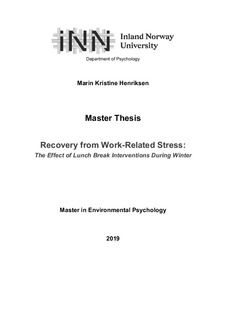Recovery from Work-Related Stress: The Effect of Lunch Break Interventions During Winter
Master thesis
Permanent lenke
http://hdl.handle.net/11250/2623848Utgivelsesdato
2019Metadata
Vis full innførselSamlinger
Sammendrag
The present thesis combined measurements, methods, and theoretical framework from both
Occupational Health Psychology (OHP) and Environmental Psychology (EP) to provide a
more nuances picture of recovery from work-related stress. A randomised pretest-posttest field
experiment was conducted with the aim to examine the immediate effects of a) progressive
muscle relaxation, and b) a walk with nature exposure on subjective recovery experiences and
outcomes, compared to a normal lunch break. All in all, employees seem to be happier and
feel more vital after a short walk, compared to relaxation. This suggests that exposure to
nature, physical activation and being away from the office has restorative effects. Furthermore,
psychological detachment increased and negative affect decreased after the intervention in
both groups, compared to their own usual lunch break. The current thesis has found a trend
towards walks as an especially effective intervention method for increasing energy and
positive emotions in employees. This suggests that lunch breaks as an intervention setting is
an imporant area for future research to focus on, because it could contribute with an
inexpensive and functional way to recover from work-related stress during the work-day.
However, the effects were somehow inconclusive and the differences were diminutive, which
suggests that more research is needed, particularily focusing on larger, more fatigued samples,
together with the potentional effects of season. The present thesis contrubutes to the litterature
by combining frameworks from both recovery, restoration, and ego-depletion perspectives. In
conclusion, to our knowledge, the current thesis is the first to consider recovery in winter, and
finding a poitive effect of ‘white’ nature on recovery from work.
